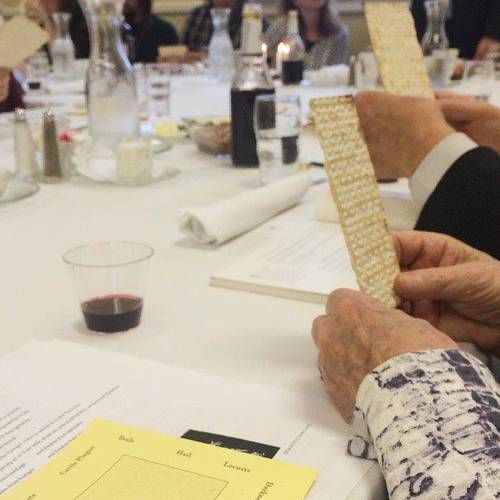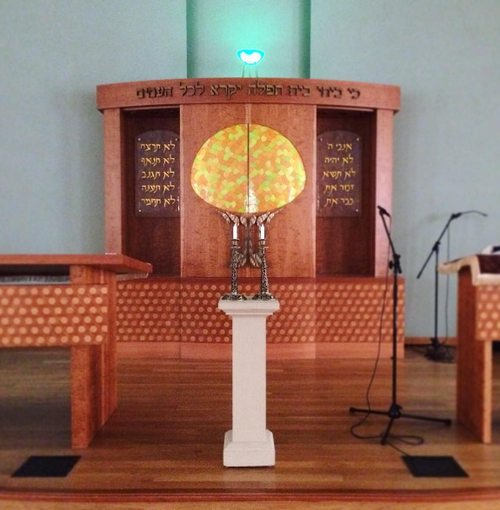Spiritual Life & Learning
Spiritual Practice
Temple Beth Hatfiloh is here to serve the spiritual needs of the individual and the community. We at TBH recognize that our spiritual journeys are personal ones, and we foster the individual’s Jewish spiritual path and engagement with theology. We also believe in the importance of communal ritual and observance. At TBH, we honor both the traditions which the Jewish people have used for centuries to mark sacred time and space as well as the creative impulse to explore new Jewish expressions.
Shabbat at TBH
The traditional day of rest at TBH is a time to take a break, connect with friends and community, study, eat, pray, sing and nourish the soul. We offer a variety of Shabbat observances to inspire and inform. This is a description of our general offerings, please check the calendar and weekly email for more specific events.
Friday night
In summer (starting after Passover), services start each week at 7:00 pm. In winter (starting after Sukkot), services will start each week at 6:30 pm.
We rotate between in-person Erev Shabbat services and hybrid offerings. Please check the weekly email for more information about upcoming scheduling.
Erev Shabbat services: Our regular Shabbat services are held on Friday night. Services are an opportunity to reflect, sing, study, discuss and be together in community.
On many first Fridays, Kol N’shama, the TBH choir leads us in song with old favorites and new arrangements.

For kids and families (but open to all!) we hold Growing Shabbat! on the second Friday of the month. This starts with a communal dinner, followed by a story time for our youngest attendees, and then a youth-oriented service.
The fourth Friday is the week of our Shabbat Salon, a program introduced in 2017. After a communal meal and Shabbat prayers, we invite a guest speaker on a topic of interest.
Scattered throughout the year will be special events such as holiday Tisches, Shabbat in the Park, ArtsWalk Shabbat and more!
Shabbat morning
On Shabbat morning we offer a rotating series of study groups to honor Shabbat and honor the Jewish tradition of study. All Shabbat morning programs start at 10:00 am.
Tot Shabbat: All kids ages 0-6 and their grown-ups and families are invited to celebrate Shabbat together with song, story, movement and prayer. Have fun with other kids and families as we carve out some time at the beginning of the day to mark Jewish time and say "thanks!" on the first Saturday of the month. Tot Shabbat includes a snack and a craft as well! In Person Only.
Shabbat Morning Service & Torah Study: Prayer and study are equally holy activities, and on the second Saturday of the month, we will start with a Shabbat morning service and a communal lunch. After lunch, we sit around a table, and study the Torah together (approximately 1:00 pm). All are invited to join in these highly participatory discussions. No experience necessary!
Mussar Torah Study: Mussar is the Jewish school of thought which seeks to root personal character development and right behavior in Jewish tradition and text. On the third Saturday of the month we will gather to learn more about this tradition and how it may benefit our lives. Mussar is an online only gathering on Zoom.
Shabbat Morning Service & Talmud Study: We begin our fourth Saturday of the month with a Shabbat morning service followed by communal lunch. After lunch, we turn to Talmud Study (approximately 1:00 pm). The Talmud is an ancient compendium of Jewish law and lore, and provides the basis upon which biblical interpretation and contemporary Jewish practice rests. Hardly a monolithic document, the Talmud contains investigation and argumentation on all facets of life. We will dive deep into this text--no background required!
This is a general calendar and subject to change. Please check the calendar or the recent newsletter for the most current information!
Holiday Celebrations
In addition to Shabbat observance, TBH hosts communal observances for all of the major holidays including comprehensive High Holiday services and events, a Sukkot gathering, Simchat Torah celebration, Hanukkah party, Tu B'Shevat seder, Purim Megillah reading and celebration, Community Passover Seder, Tikkun Leyl Shavuot and Tisha B'Av observance.
Sacred Space
When moving from our original to our present building in 2004, TBH members agreed that it was important to maintain the intimate feeling of praying in the old, smaller shul. This desire led to careful redesign of space in the new sanctuary. The low bimah (platform), wooden floor, and movable seating in the front area create an intimate, acoustically resonant and highly participatory context for regular services. At the same time, the Sanctuary has the ability to accommodate large groups and to serve as a place for more formal and decorous services.
 The design of the bimah intentionally highlights the value of accessibility. In addition to the ramp in the front, which provides physical accessibility, the bimah is low to the ground and open on all sides so that one can ascend the bimah, and approach the Ark, from any direction. Thus the Torah is accessible to all, and hierarchy is limited. In this way, the sanctuary flexibly fulfills our congregation’s needs for sacred space.
The design of the bimah intentionally highlights the value of accessibility. In addition to the ramp in the front, which provides physical accessibility, the bimah is low to the ground and open on all sides so that one can ascend the bimah, and approach the Ark, from any direction. Thus the Torah is accessible to all, and hierarchy is limited. In this way, the sanctuary flexibly fulfills our congregation’s needs for sacred space.
As a testament to our values, the sanctuary is adorned with three biblical verses:
Eastern Wall: “From east to west the name of God is praised.” –Psalm 113:3
Tradition holds that during prayer one faces Jerusalem and the site of the ancient Temple, and synagogues in North America are therefore usually oriented towards the east. The TBH sanctuary is oriented toward the south, as our building was not originally built as a Jewish house of worship. However, TBH maintains the custom of praying towards Jerusalem. With the strong TBH emphasis on community, orientation towards a particular point in space conceptually leads to all Jews praying together, in unity, as one congregation. And since Jews face a different direction based on where they are in the world, that “one congregation” ultimately faces each other. The verse adorning the eastern wall is traditionally associated with a Mizrach (“east”), a marker of the eastern wall in Jewish homes and communal spaces.
 Western Wall: “Let the mountains produce peace for the people, the hills the reward of justice.” – Psalm 72:3
Western Wall: “Let the mountains produce peace for the people, the hills the reward of justice.” – Psalm 72:3
While we face east for prayer, we are a congregation located in the American West. This verse recognizes our geographic location by evoking the many hills and mountains which surround us and are visible from Olympia. This verse also highlights values which are important to us as a congregation: a commitment to peace, justice, righteousness and charity.
Aron Kodesh (Holy Ark): “My House shall be called a house of prayer for all peoples.” –Isaiah 56:7
This verse contains the name of our community—beit tfilah, “house of prayer.” It speaks to the universal aspirations of Judaism as we seek to transform not only ourselves, but the world, for the good. This verse reminds us that there are many paths to God and the sacred, the fact that we need to be mindful and open to all, and that TBH is more than a place for worship, but a community center and beit am—“a house of the people.”
Thu, November 20 2025
29 Cheshvan 5786
Upcoming Events
-
Thursday ,
NovNovember 20 , 2025Sigd Celebration
Thursday, Nov 20th 6:00p to 8:00p
-
Friday ,
NovNovember 21 , 2025Hybrid Erev Shabbat Service
Friday, Nov 21st 6:30p to 9:00p
-
Saturday ,
NovNovember 22 , 2025Tot Story Walk during service
Shabbat, Nov 22nd 10:00a to 11:30a
Newsletters
Stay Connected
TBH is located at 201 8th Ave. SE in Olympia, just one block west of the downtown library.
Privacy Settings | Privacy Policy | Member Terms
©2025 All rights reserved. Find out more about ShulCloud





